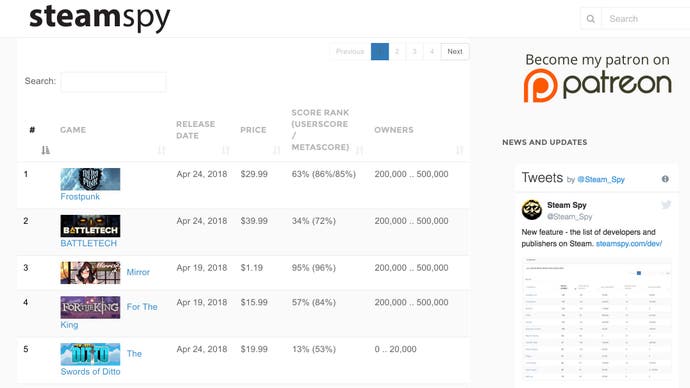Things are starting to look up for Steam Spy
After Valve's privacy changes broke it last month.
Last month, Valve made changes to Steam's privacy settings which hid certain user information by default. Unfortunately, access to this data was crucial for respected stats site Steam Spy to function, and the service was essentially crippled as a result. Now, however, its future is looking brighter.
Shortly after Valve's privacy changes were unveiled, Steam Spy creator Sergey Galyonkin announced that his service wouldn't "be able to operate any more", later expanding on that in an interview with Eurogamer.
Problematically for Steam Spy, Valve's adjustments meant that a Steam user's owned games were no longer publicly visible on their profile by default. Additionally, according to Galyonkin in a new post on his website, Steam's Store API, which contained basic information about games - such as prices, release dates, and genres - was changed, making it "useless".
Without this wealth of information, Steam Spy was unable to accurately extrapolate and display the kind of data it was known for, including PC game sales. It seemed like that would be the end for the service, but Galyonkin's now says he may have found a solution to save it.
Encouragement to continue with the project, he explained, came from "over two hundred emails and messages" he received from developers "telling me how [it] improved their lives."

"There was an indie company from Berlin that managed to secure financing from the government for their niche title because they had the data to prove that this niche is big enough," Galyonkin revealed, "Then there was a successful mid-sized publisher that entered the business after it was able to see which games are selling and which don't.
"And then there were your usual stories of developers being able to navigate the space because they knew how the market behaves now."
These positive stories of Steam Spy's impact were enough to convince Galyonkin that he should "try a couple of new things". Specifically, he revisited learnings from back in his PHD days, which focussed on "predicting economic outcomes based on accidental data that might be irrelevant to the predicted results using machine learning."
Although Steam's precise data may no longer be available to Steam Spy, Galyonkin soon discovered that "there's a ton of coincidental data on games" on the internet that, along with a modified algorithm, could potentially be used to estimate the likes of product sales and restore Steam Spy's functionally. Best of all, it seems Galyonkin's new methodology "kinda works".

"Frostpunk devs just announced that the game sold 250,000 copies," he explained by way of example, "and the new algorithm estimated it at 252,000 copies. Pretty close, right?"
The problem right now, however, is that the new Steam Spy is simply "not very accurate." Galyonkin says that he has "the data for around 70 games from different developers, and for 90% of them, the new Steam Spy is within 10% margin of error." Unfortunately, there are "some crazy outliers, where the difference between the estimates and the real data could be fivefold".
Galyonkin says that he's "still not entirely happy with my new algorithm and its precision". As such, Steam Spy will remain semi-closed for now, with only limited features available to the general public. Patreon backers, however, will continue to have access to "precise estimates and the graphs, like before".
Furthermore, many of Steam Spy's features are still inaccessible while Galyonkin rewrites the site "to move to the new math model". He does note, however, that "most of them will be coming back". Country stats are temporarily removed, for instance, but basic features including the number of owners, playtime distribution, and related games "are working fine already".
Galyonkin says he'll "keep on iterating the new algorithm while slowly bringing back the core functions of Steam Spy. It will take some time and it's still possible that Valve will make another move to shut down the service, but until that happens, Steam Spy will continue to operate."

